|
|
|
Sort Order |
|
|
|
Items / Page
|
|
|
|
|
|
|
| Srl | Item |
| 1 |
ID:
111595
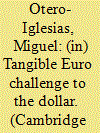

|
|
|
|
|
| Publication |
2012.
|
| Summary/Abstract |
The main purpose of this article is to shift the dollar vs Euro debate away from US-EU centrism to perspectives from emerging markets. Drawing on 40 semistructured financial elite interviews in Brazil and China, the key research question studied here is whether the US dollar is malfunctioning as the leading international currency in these parts of the world, and, if so, whether the Euro can be an alternative to the greenback. The results show that the status of the dollar as the main anchor in the monetary system is seriously questioned among financial elites in China and Brazil. As yet, though, the Euro does not represent an alternative to the dollar because of its fiscal and political fragmentations. However, despite these institutional shortcomings, the European currency is seen as an ideational role model for super-sovereign monetary integration out of dollar unipolarity based on consensual negotiations not only on a regional, but also on a global scale.
|
|
|
|
|
|
|
|
|
|
|
|
|
|
|
|
| 2 |
ID:
123651
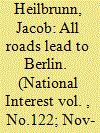

|
|
|
|
|
| Publication |
2012.
|
| Summary/Abstract |
BACK IN November 2011, as Europe struggled with its ongoing financial crisis, Poland's foreign minister, Radek Sikorski, gave a speech in Berlin that beckoned toward his country's western neighbor and pleaded with it to save the euro. "You know full well that nobody else can do it," said Sikorski. "I will probably be the first Polish foreign minister in history to say so, but here it is: I fear German power less than I am beginning to fear German inactivity. You have become Europe's indispensable nation."
|
|
|
|
|
|
|
|
|
|
|
|
|
|
|
|
| 3 |
ID:
125218
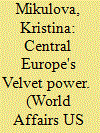

|
|
|
|
|
| Publication |
2013.
|
| Summary/Abstract |
Central Europe used to be a place of tragedy, according to Czech novelist Milan Kundera, a leading dissident voice during the communist era. Throughout its troubled history, the region, fatefully wedged between Germany and Russia, suffered deep wounds to its psyche at the hand of great powers: oppression by enemies, betrayal by friends. Its battered societies were so busy trying to survive, Kundera mused, that they did not have the leisure to look inward and focus on themselves.
|
|
|
|
|
|
|
|
|
|
|
|
|
|
|
|
| 4 |
ID:
141700
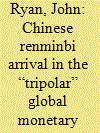

|
|
|
|
|
| Summary/Abstract |
Since the financial crisis hit in 2007, the US dollar privilege has not only become “exorbitant” but “extortianate.” Countries such as China are no longer willing to allow the USA to exercise this extortionate behavior. The potential geopolitical implications of a US dollar decline are immense. The USA would lose its privileged seigniorage position and with that the ability to achieve permanently higher returns on foreign assets than the returns paid to foreigners who invest in the USA. The global economy is already close to operating with three regional exchange rate anchors: the US dollar; the euro; and, increasingly, the renminbi. Hence, the transition to a tripolar system could occur sooner than many assert. Nevertheless, given the importance of financial deepening and integration in the internationalization of currencies, any shift will still be gradual.
|
|
|
|
|
|
|
|
|
|
|
|
|
|
|
|
| 5 |
ID:
127042
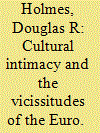

|
|
|
| 6 |
ID:
125920
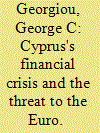

|
|
|
|
|
| Publication |
2013.
|
| Summary/Abstract |
This essay analyzes Cyprus's financial crisis and its potential threat to the eurozone. The focus is on the economic consequences of the terms of the bailout agreement dictated by the Troika or Eurogroup for the Cyprus economy as well as its significance for any future bailouts. Given the insignificant size of the Cypriot economy for the eurozone as a whole, the Cyprus case was treated more as a political exercise and held up as an example for other eurozone members rather than seen as a serious economic threat, while little attention was given to its potential as a precedent for future bailouts.
|
|
|
|
|
|
|
|
|
|
|
|
|
|
|
|
| 7 |
ID:
093077
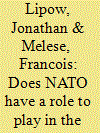

|
|
|
|
|
| Publication |
2009.
|
| Summary/Abstract |
The financial crisis endangers the security of NATO's members and partners. As such, NATO has a formal obligation to mobilize its resources to aid members in overcoming current economic challenges. NATO can play a valuable role on three levels. First, NATO can aid members in rationalizing their military procurement and manpower systems, thus reducing the fiscal burden of maintaining adequate defenses. Second, NATO can press the ECB and the EU to modify arrangements governing the Euro so as to minimize the risk that EMU will collapse. Finally, NATO has a "soft power" role in vigorously defending the liberal economic order and democratic political institutions of the Western Alliance from the ideological attacks that inevitably follow financial crises.
|
|
|
|
|
|
|
|
|
|
|
|
|
|
|
|
| 8 |
ID:
111025
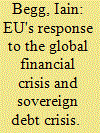

|
|
|
|
|
| Publication |
2012.
|
| Summary/Abstract |
Since the sovereign crisis erupted in the autumn of 2009 when the true scale of the Greek fiscal deficit was revealed, the European Union (EU), and especially the euro area, has staggered from crisis to crisis. Major initiatives have, however, been taken to improve economic governance and to put in place a more resilient framework for the euro. This article assesses how the EU has responded to the crisis and offers explanations for why the reform process has been slow and indecisive. It shows that potentially enduring solutions are on the table, but that they have been hard to introduce because of differing national perspectives and disagreements about how the burdens of adjustment should be shared. The article concludes by setting out plausible options and explaining what they entail.
|
|
|
|
|
|
|
|
|
|
|
|
|
|
|
|
| 9 |
ID:
085849
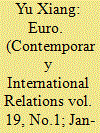

|
|
|
|
|
| Publication |
2009.
|
| Summary/Abstract |
2009 marks the 10-year anniversary of the launch of the euro, a historic undertaking which drew a veil over centuries of conflict and set Europe on an unprecedented path of cooperation and integration.
|
|
|
|
|
|
|
|
|
|
|
|
|
|
|
|
| 10 |
ID:
066763
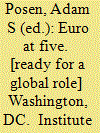

|
|
|
|
|
| Publication |
Washington, DC, Institute For International Economics, 2005.
|
| Description |
xi, 204p.
|
| Series |
Special report 18
|
| Standard Number |
0881323748
|
|
|
|
|
|
|
|
|
|
|
|
Copies: C:1/I:0,R:0,Q:0
Circulation
| Accession# | Call# | Current Location | Status | Policy | Location |
| 050395 | 332.494/POS 050395 | Main | On Shelf | General | |
|
|
|
|
| 11 |
ID:
159352
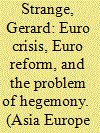

|
|
|
|
|
| Summary/Abstract |
The article applies the contested concept of hegemony to the euro and the eurozone crisis of 2009–12 to critically scrutinise the parameters and limits of the euro reform process. Conceptualising the euro as a ‘public good’ designed to help stabilise and legitimise the EU’s regional market order is a useful ideational starting point for critical inquiry, one that is in line with hegemonic stability theory. However, drawing on neo-Gramscian theory, the article contends that, in practice, the euro has been self-limited through its ‘external’ and ‘internal’ embedding in a neoliberal form of ‘minimal hegemony’. While the reform process has achieved some notable stabilising changes to the support structures and governance of the euro, nevertheless, reform has largely failed to tackle fundamental problems at the heart of the euro’s tendency towards crisis: the single currency’s subordination to a global financial regime dominated by neoliberalism, Germany’s neo-mercantilist dominance of the eurozone economy and fundamental differences of macroeconomic conceptualisation and preferences between the eurozone’s core states, France and Germany. The article critically scrutinises developments in eurozone monetary policy in the wake of the crisis to demonstratively argue that the euro remains locked in to a form of minimal hegemony that constrains the development of the euro as a ‘deep and genuine’ public good.
|
|
|
|
|
|
|
|
|
|
|
|
|
|
|
|
| 12 |
ID:
135075
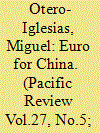

|
|
|
|
|
| Summary/Abstract |
The aim of this paper is to analyze China's strategy in relation to the euro. The first section summarizes China's active support to the single currency since its creation up to the first phase of the current Eurozone debt crisis. It shows how China has used a two-pronged approach. It has developed a public campaign in favor of the euro, especially when the market sentiment has been bearish on the single currency, and it has continued to be an active player in the European sovereign debt markets. The second part explains why China has been so supportive. Beijing wants to move away from dollar hegemony and thus it favors a tripolar monetary system based on the US dollar, the euro and the Chinese renminbi (RMB). With this aim, and despite the crisis, China has continued to diversify its foreign reserves into the euro making it by now ‘too important to fail’, not only because China holds roughly $1 trillion in euro-denominated assets, but also because for China the Eurozone is a crucial market and an important strategic counterweight to US dominance in world affairs. Finally, the third part focuses on how by the end of 2011 China switches to a more cautious approach due to the difficulty involved in rescuing the Eurozone. Domestic pressures, public outcry in Europe against being saved by China, the unwillingness of the European leaders to enter into strategic bargaining and Germany's strategy to use sovereign bond spreads as a market mechanism to create ‘more Europe’ have convinced policy-makers in Beijing to keep a lower profile while making sure the value of the euro remains stable.
|
|
|
|
|
|
|
|
|
|
|
|
|
|
|
|
| 13 |
ID:
128841


|
|
|
|
|
| Publication |
2014.
|
| Summary/Abstract |
Germany's highest court stopped short of ruling the European Central Bank's programme to support the euro illegal. Now the European Court of Justice must find a way to make the programme acceptable without making it ineffective.
|
|
|
|
|
|
|
|
|
|
|
|
|
|
|
|
| 14 |
ID:
097261


|
|
|
|
|
| Publication |
2010.
|
| Summary/Abstract |
Euro-Atlantic" as a political power brand name was employed possibly for the first time in a 1985 speech by Bettino Craxi, then president of the European Council, when he spoke about "Italy's Euro-Atlantic role." Its political usage was codified in the label Euro-Atlantic Partnership Council (EAPC), a group formed in 1997 and which now numbers fifty "partner" governments. EAPC is the successor to the North Atlantic Cooperation Council. (The NACC was created as an adjunct to NATO six years earlier in the first flush of post-Cold War Europe.) Among EAPC partners are not only eleven far-flung (and non-Atlantic-riparian) governments of the former Soviet Union-from Armenia to Uzbekistan-but also the six republics of the former Yugoslavia. Russia itself is listed among the partners, although its leaders remain highly suspicious of the NATO parent.
|
|
|
|
|
|
|
|
|
|
|
|
|
|
|
|
| 15 |
ID:
102788
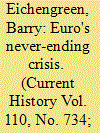

|
|
|
|
|
| Publication |
2011.
|
| Summary/Abstract |
The fact that resolving the crisis will be costly has one silver lining. It concentrates attention on the need to reform the institutions of the euro area to prevent equally costly crises from occurring again
|
|
|
|
|
|
|
|
|
|
|
|
|
|
|
|
| 16 |
ID:
152758
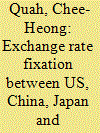

|
|
|
|
|
| Summary/Abstract |
This article assesses the feasibility of exchange rate fixation among the largest economies today, namely, the US, Japan, China and Germany/Eurozone, by reviewing variables according to the optimum currency areas framework. The hypothesis is that with greater interconnectedness in general through time there should be greater convergence in the monetary integration dimensions. The period examined spans from 1980 to 2012, an over-30-year period, encompassing the recent episode of global contraction. While the findings are mixed, economically they seem to suggest a general trend towards greater compatibility or at least one which is not in serious contradiction to exchange rate fixity, particularly for the US and Eurozone.
|
|
|
|
|
|
|
|
|
|
|
|
|
|
|
|
| 17 |
ID:
108953
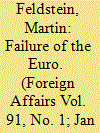

|
|
|
| 18 |
ID:
148682
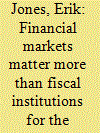

|
|
|
|
|
| Summary/Abstract |
Many argue that the euro is handicapped as a currency because European governments are unwilling to pool responsibility for fiscal policy in common institutions. This argument is derived from the theory of optimum currency areas and fuelled by analogy with US experience. It is mistaken. A monetary union does not need a fiscal union to work. Worse, efforts to build European fiscal institutions are likely to distract European policymakers from a more important agenda. Europe needs a fully functioning banking union with a common risk-free asset if Europeans want to stabilise the euro as a common currency. Moreover, it would need these things even if the euro did not exist and all it had was the common market. Financial stability – and not fiscal federalism – is the key to Europe's future. European policymakers should focus their efforts on building the necessary institutions.
|
|
|
|
|
|
|
|
|
|
|
|
|
|
|
|
| 19 |
ID:
083058
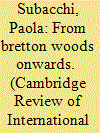

|
|
|
|
|
| Publication |
2008.
|
| Summary/Abstract |
Will the dollar soon lose its key international currency status? In this article I argue that neither the emergence of the Euro nor geopolitical issues threaten the future of the dollar. The world's central banks may slow down their accumulation of dollars, but are unlikely to put an end to the dollar standard regime. I also caution against confusing the international role of the dollar as the supreme store of value with its two other roles-as the dominant international unit of account and medium of exchange. These latter two functions do not change abruptly, meaning, once again, that there is no immediate threat to the future of the dollar. The article also discusses similarities between today's dollar standard and the Bretton Woods regime, and conclude that the complexity of today's system is such that it cannot just be defined as a repetition of the Bretton Woods system, or 'Bretton Woods 2'.
|
|
|
|
|
|
|
|
|
|
|
|
|
|
|
|
| 20 |
ID:
114117
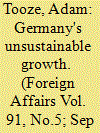

|
|
|
|
|
| Publication |
2012.
|
| Summary/Abstract |
Germany seems like Europe's lone island of fiscal stability, but trouble lurks under its impressive export-fueled growth. An obsession with debt and austerity has blocked domestic investment as the country has ignored problems such as a shrinking work force and outdated infrastructure. Germany needs to borrow and spend more or face the end of its economic miracle.
|
|
|
|
|
|
|
|
|
|
|
|
|
|
|
|
|
|
|
|
|